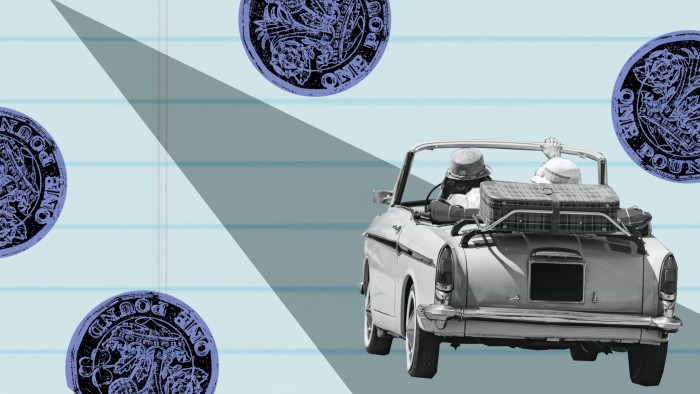Taxing questions for retirement

Roula Khalaf, Editor of the FT, selects her favourite stories in this weekly newsletter.
There was much pre-Budget speculation as to how Rishi Sunak, the chancellor, would attempt to tackle the colossal hole in the country’s finances left by a year of emergency measures to tackle Covid-19.
As far as personal taxes were concerned, the possibility of radical surgery, perhaps to capital gains tax (following a 2020 review from the Office of Tax Simplification) or to tax relief on pension contributions, was mooted.
In the event, Sunak opted for an approach that was both easier to implement and easier to sell to taxpayers — freezing allowances on wealth taxes and pensions for the next five years. But what do these “stealth taxes” mean for investors and pension savers?
Pension lifetime allowance
The amount that can be held tax-efficiently in pensions will remain at £1,073,100 until 2026. Edward Grant, tax specialist at St James’s Place, calculates that the freeze will reduce the projected lifetime allowance (LTA) in April 2026 by £125,000.
But while the current £1m plus allowance might sound generous, it will buy a 65-year-old an inflation-linked annuity of only about £26,000. As Steven Cameron, pensions director at Aegon, observes, that’s “not exactly enough to provide a lifetime of luxury”.
More significantly, a frozen threshold alongside rising earnings and investment values means that over time, the number of working people affected will steadily rise — including those who may currently not feel under threat.
Tom Selby, senior analyst at AJ Bell, gives an example: “A 50-year-old with a £500,000 pension who made £500 a month contributions and enjoyed 8 per cent annual investment growth would hit the lifetime allowance by their 61st birthday.”
Assuming the same annual growth rate, a 60-year-old with a fund worth £700,000 today who makes no more contributions would hit the limit by age 66.
“Even those who have started taking an income need to take the lifetime allowance into account, because HM Revenue & Customs tests any growth you have enjoyed on your fund at age 75,” Selby adds.
The Next Act

Read more articles in our free-to-read Next Act series
Why women are worse off in retirement
Your financial adviser will Zoom you now
Silver Splitters count the cost of divorce
The freeze will also affect senior public sector workers with generous final salary pensions. “The lifetime allowance in these schemes is an annual pension amount of one 20th of the ‘cash’ limit, or £53,655 a year,” says Cameron. “It would be interesting to see any analysis the chancellor has done over how many NHS doctors or headteachers might be hit by this change.”
The LTA freeze is a particularly controversial move, not only because it penalises people for trying to “do the right thing” and make provision for their later years, but also because the LTA has repeatedly been tampered with.
As Sir Steve Webb, partner at consultant LCP, observes: “Since the LTA was introduced in 2006 it has been increased, cut back dramatically and frozen. We need the Treasury to settle on a long-term strategy for pension tax relief, rather than just using the system as a convenient source of cash to be turned on when public finances are tight.”
Capital gains tax
The annual CGT allowance has been frozen at £12,300. Pre-Budget concerns focused on the risk of a hike in the current 20 per cent rate to bring CGT into line with the top income tax rate of 45 per cent, so the reality feels like something of a reprieve.
However, in conjunction with the £20,000 annual Isa allowance freeze also announced in the Budget, it could spell trouble for an increasing number of investors in coming years.
“The potent combination of a freeze in Isas and CGT allowances makes it essential that investors shelter their investments from tax,” says Moira O’Neill, head of personal finance at Interactive Investor.
That means making maximum use of both allowances, including selling taxable holdings and repurchasing them within the tax-free wrapper (known as “Bed & Isa”).
Although there were no significant changes in this Budget, it is obviously possible that changes may be looming in the coming years. Sunak made no promises regarding CGT rates, and Andrew Dixon, head of wealth planning at Kleinwort Hambros, considers them an “obvious” target.
Inheritance tax
The basic IHT nil rate band, currently £325,000, has not increased since 2009, although the phased introduction of the residential nil rate band in 2017 means that as of the 2020/21 tax year, couples may jointly be able to pass on assets worth up to £1m if they leave the family home to their children or grandchildren.
Looking ahead, one possible weapon in the chancellor’s armoury is to bring unused pension assets into the scope of IHT.
Currently, under the pension freedoms introduced by George Osborne in 2015, those who move their pension into drawdown and draw an income directly can leave any funds remaining on death to their beneficiaries free of IHT — although if they die aged 75 or older, the beneficiaries will pay income tax on withdrawals.
Dixon believes the change is a real possibility from a political perspective. “The current government takes more of its votes than previous Tory governments from those less likely to benefit from passing on their pension fund free of IHT, so it is not a certainty to remain,” he says.
In Cameron’s view, however, such a move is “at the extreme end of the spectrum, with a multitude of knock-on consequences, many of which would go against core pension policy objectives of encouraging people to save adequately for retirement and use their accumulated funds flexibly”.
Either way, further material change in the tax situation is not expected this year. Although the government has announced a “tax day” on March 23, the focus is expected to be on tax administration — for example HMRC’s push to make tax more digital — rather than further tax policy changes.
“We’re expecting a set of consultations, and assume that many — if not all — will be relatively technical,” says Webb. “Treasury says that there will be no fiscal implications in 2021/22, but that doesn’t mean there won’t be impacts further down the track.”
Faith Glasgow is a freelance journalist and the former editor of Money Observer. Twitter: @faithglasgow
Comments